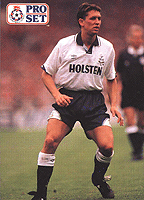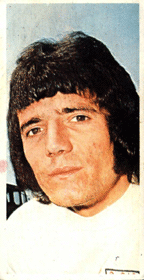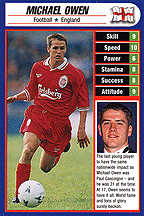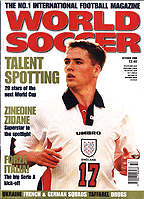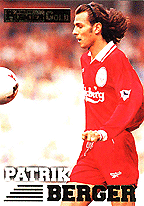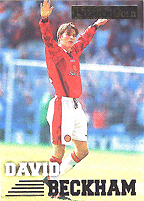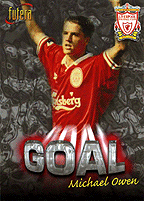![]()
The name of Michael Owen
hardly struck fear into the hearts of defenders when the 1997-98 soccer season
began.
Months later he was the talk of the English game, touted as the future of
the British national team. His rise to success—launched with the same
brilliance and speed of one of his patented goal-scoring runs—has come
as no surprise to those who nurtured his development. At every step of his
career, Michael has achieved super stardom. This is his story…
GROWING UP
Michael Owen was born on December 14, 1979 in Chester, England. The fourth of five children, he was raised in a tight-knit household by his parents, Jeanette and Terry. All the Owen kids were doted upon and encouraged to pursue diverse interests. The family lived in Hawarden, in the Welsh county of Clwyd. Terry, a central midfielder for Everton and Chester, was approaching the end of his soccer career when Michael came into the world. In 300 matches, he recorded a very respectable 70 goals.
Terry did not introduce Michael to soccer until the age of seven. Prior to that, he encouraged his son to work on his pugilistic talents at the Hawarden Boxing Club, believing they might help him look after himself later in life. Meanwhile, Terry spent hours playing soccer with his two eldest boys, Terry Jr. and Andrew, at a small field near the Owen home. But he soon realized that Michael was the most promising athlete in the family. Terry found a coach, Howard Roberts, to help develop Michael's considerable talents. Roberts, a local physical education teacher, managed the Mold Alexandra Under-10s.
Though Michael was only eight, Terry insisted that his son play regularly with the Under-10s. Roberts agreed, and sought to legalize Michael's position on Mold Alexandra. At the time, rules stipulated that children had to be at least eight to play in the league. Michael's small size led some to believe he was too young. Jeanette eventually wrote a letter attesting to her son's age and granting him permission to compete.
Michael flourished against his older and rougher competition. He finished his first season with 34 goals in 24 games, scoring nine in the first 20 minutes of one match before his coach called off the dogs and placed him in goal. Roberts often hesitated to put his star on the field against teams with bigger players, fearing the fate that awaited his undersized scorer. But whenever Michael got flattened or bullied, he laughed it off and continued on.
Given his nose for the goal, Michael typically played the center-forward (or striker) position. What impressed Roberts the most was his ability to run “off the ball." While his teammates would charge into the box cavalry style, Michael would delay his runs until the right moment, inevitably meeting the ball when it arrived from the cross. Also, his capacity to move with the ball at full speed sent defenses into disarray and opened up the pitch for others. Michael's pace, even at a young age, was breathtaking, and as he danced up the field he would often sprint 40 yards barely touching the ball, knowing just how far ahead to put it so that he didn't break his stride.
After one season with Mold Alexandria, Michael was invited to a tryout for the Under-11 team of Deeside primary schools. Already a minor celebrity, he and his goal-scoring feats had been great fodder for local newspapers. His fame increased further when he came under the tutelage of coach Dave Nickless. Playing for two different squads—Hawarden Rangers and St. David's Park—Michael terrorized defenses for two years. When he netted a hat trick at the 1980 Jersey Festival, he brought his career total to a record 97 goals.
By this time, Michael had become a student of the art of goal scoring. He was getting more and more clinical in his finishing technique, taking balls at fantastic speed yet never looking hurried. Unlike others his age, Michael thought his way around the field. Rather than blasting shots toward the goal and hoping for the best, he would put the ball in the corner of the net or side-foot it home, displaying a calm disposition and coolness under pressure normally associated with players three times his age.
Some of Michael's soccer sophistication came from his father. Terry constantly talked strategy with his son, and instilled in him a sense of professionalism that set the boy apart. Michael never showed up for a game or practice without the proper uniform. Nor did he ever utter a word of dissent to Nickless or his assistant, Ron Bishop. And despite being an acknowledged phenom, he was always popular with his teammates, who appreciated his ability to win matches without upstaging them.
ON THE RISE
By the time Michael
turned 11, just about every big club in England had its eye on him. Among
the scouts who pursued him was Brian Kidd, a former player for Manchester
United and the team's current youth director. After watching Michael score
six second-half goals in a game for Deeside, he wanted to sign him on
the spot, but his hands were tied by Football Association regulations
which restricted the travel of boys Michael's age.
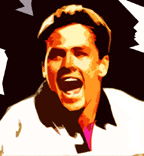
Michael enjoyed the attention he was receiving, and spent several weeks visiting the facilities of several Premiership clubs, including Manchester, Arsenal, and Nottingham Forest. He even trained for a week at Everton, the Liverpool club for which his father had played during part of his career. Michael was a rabid Everton fan, and especially liked the team's goal-scoring hero, Gary Lineker.
Michael ultimately found a home with the Reds of Liverpool. Steve Heighway, the club's director of youth development, had slyly been recruiting him for years. Heighway always found a way to get tickets for the Owens to big matches, and once went so far as to supply Michael with new soccer shoes. The youngster never forgot those gifts and favors, and when he and father discussed his future as a professional, they agreed that Liverpool's program was the right choice.
By the end of 1990, Michael had officially signed apprenticeship forms with the Anfield, one of Liverpool's lower-tier clubs. He quickly established a reputation as a soccer prodigy. Over the next several years, it was not unusual to see the country's top pros in the stands at his games.
At the age of 14, Michael joined the English FA's School of Excellence at Lilleshall, a boarding camp just north of London where youngsters are housed for an intense soccer training program. There he was surrounded by a prestigious crowd of young talent, including Wes Brown and Francis Jeffers. Competition was intense. Indeed, only two apprentices from the School of Excellence are promoted to the professional grade each year.
For Michael, the challenge was twice as demanding. He spent the whole of 1994 splitting his time between the School of Excellence and Liverpool's youth training ground. Part of his stay at Lilleshall called for mandatory classroom sessions. Michael studied hard and passed his required GCSE exams, which qualified him to pursue higher education if and when he desired to.
In December 1995, Heighway rewarded Michael with his first start for England's Under-15 team. The teenager scored in his debut, and went on to tally 11 goals in his next seven games. He finished the year as the all-time leading scorer for England at the schoolboy level. The only disappointment for Michael came in a 4-2 defeat against Germany at Wembley Stadium. He netted a goal, but defensive frailties spelled England's demise. Against Brazil a month later, he erased the bad memory of the Germany loss with a tally early in the second half that stood up in a 1-0 win.
Michael next led Liverpool
in the FA Youth Cup. He scored a hat trick against Manchester United,
the defending champs, then followed that performance with a goal in the
final, as Liverpool won the competition for the first time.
After making the jump to the Under-16s, Michael quickly graduated to the next level. For the 1996-97 season, he was assigned to the Under-18s. Michael impressed his coaches immediately, scoring all four goals in a match against Northern Ireland. He was later awarded the captain's armband.
Michael's leadership abilities were put to the test against a highly physical and crafty Yugoslavia side. A marked man the entire match, he was bumped, battered and dragged down time and again in and around the box. With no help from the referee, Michael's frustration grew. When he was hammered by a Yugoslavian defender with 20 minutes to go, he elbowed the opponent in the stomach and sent him tumbling to the ground. The foul was obvious and deliberate, a none-too-subtle way of telling the referee to take control of the match. But the move backfired—Michael was shown a red card for his transgression. Afterwards he got a stern lecture from his father. Embarrassed by his behavior, Michael apologized and learned a valuable lesson about keeping his composure.
With dreams of joining the likes of Kevin Keegan and Kenny Dalglish in the pantheon of hometown stars, Michael signed a professional contract with Liverpool in December 1996, just four days after his 17th birthday. Five months later, he made his English Premiership debut against Wimbledon. Within 10 minutes of entering the game as a substitute in the second half, he notched his first goal. It came after Robbie Fowler drew a foul in the box. Michael eagerly took the resulting penalty kick and side-footed the ball into the back of the net. Though Liverpool lost the match, fans left the stadium abuzz about their amazing rookie. Even when the club finished the season in the middle of the standings, Michael dominated the local headlines.
Over the summer, Michael traveled with the English Under-21 team to Malaysia for the 1997 World Youth Cup. Each club's roster read like a Who's Who of future international sides. Michael was splendid in these matches, and for the first time caught the attention of fans outside England.
MAKING HIS MARK
Michael rejoined his Liverpool teammates at the end of June and began preparing for the 1997-98 season. The year started
with coach Roy Evans looking for someone to compliment the scoring touch of Fowler. He looked to the European market, bringing in Karl-Heinze Riedle from Germany. But when Fowler went down with a thigh injury after only the second match of the season, Evans turned to Michael.
The teenager took
full advantage of this golden opportunity. In a Premiership game in August,
Michael out-dribbled the entire Blackburn defense to score a delightful
goal. Several weeks later he was again on form, mesmerizing the Glasgow
Celtic back line during the UEFA Cup. In front of 48,000 mostly hostile
fans, he sprinted thirty yards before calmly beating the keeper to give
Liverpool an early lead. Glasgow eventually knotted the score, however,
and the matched ended in a tie.
Before long Michael and Riedle began to gel. Initially, the veteran rode his young teammate hard. Michael was berated by Riedle for rookie mistakes and selfish play. Rather than hanging his head, he profited from the harsh lessons, expanding his game and making full use of his ability to explode down the field while dribbling with the ball.
Terry Owen watched his son's progress with a concerned eye, wary that Michael might burn out in his first full Premiere season. He asked the Liverpool coaches to monitor his son's training and playing time. Evans acceded to the request, but felt all along that Michael's innate feel for soccer would allow him to pace himself accordingly. When Fowler returned to the lineup, the coach paired him with Michael on the front line. Surprisingly, the two didn't mesh. For some reason, Michael's runs around the box and Fowler's willingness to scrap for balls in the middle of the field simply didn't click. Still, Michael found the net often enough to win the Golden Boot Award as the top scorer in British soccer with 18 goals in 36 games.
Michael landed squarely in the public spotlight, as the national media offered a steady stream of stories about him. The 17-year-old handled the attention with calm and maturity. While many young players were famous for their off-field antics—Jamie Redknapp, Steve McManaman, David James, and Phil Babb became known as the "Spice Boys"—Michael remained removed from the temptations of Liverpool's lively night scene.
His professionalism didn't go unnoticed. In February of 1998, Michael got the call from national coach Glenn Hoddle for a friendly match between England and Chile. Hoddle had fiddled with the decision for some time, realizing the pressure on the youngster would be immense. He inserted Michael to begin the second half, and the teenager showed his nerves by missing several good scoring chances. Still, the media, fans, and coaches all agreed that his speed and touch were developed enough to warrant a spot on England's team for the upcoming World Cup in France.
England's berth in the tournament was extremely fortunate. Indeed, the squad earned its trip to France after Italy failed to score against Ukraine in the final match of their qualifying group. England was placed in a bracket with Tunisia, Romania, and Colombia. The sentiment back home was that Hoddle's troops would advance to the second round but fail to go much farther. Though the coach shocked many by leaving playmaker Paul Gascoigne off the roster, observers salivated at the thought of combining super striker Alan Shearer and Michael up front. Ever cautious, however, Hoddle sat Michael and another talented youngster, David Beckham, for England's opening match against Tunisia. The English lost 2-0.
With fans chanting
Michael's name throughout the first half of England's next match against
Romania, Hoddle put the youngster into the game after 20 minutes. He responded
with a marvelous effort. With England trailing 1-0, Shearer hammered in
a short cross from the right. Michael flung himself forward and hooked
the ball into the Romanian goal to tie the game. That was all the offense
England could muster, however. A late goal by Dan Petrescu gave Romania
a 2-1 victory.
Desperate for a win against Colombia, Hoddle had no choice but to start Michael. His presence provided the necessary spark. Beckham and Darren Anderton each scored goals, and Michael and Shearer tortured the Colombians with their speed, passing and dribbling. The 2-0 victory enabled England to squeak into the next round. The legend of “Boy Wonder" was beginning to grow.
England's next opponent was arch-rival Argentina, a match that 40 million fans back home eagerly awaited. The build-up was intense. For his part, Michael welcomed the chance to play in Toulouse Stadium of Saint-Etienne, nicknamed the “pressure-cooker" for the closeness of the stands to the pitch. Argentina broke out on top on a goal by Gabriel Batistuta. England fought back minutes later; Michael forced a foul, and Shearer notched the equalizer.
Then, in what most of England claims to be the greatest goal ever scored by a countryman on the world stage, Michael put his team ahead. On a clever pass from Beckham, he accelerated past two Argentine midfielders, dribbled around defender Roberto Ayala, then beat keeper Carlos Roa. The Argentinians later drew even, and the match ultimately moved to penalty kicks. Michael, second in line for England, converted his attempt, but it was not enough. The English were eliminated, though they didn't leave France with their tails between their legs. And 18-year-old Michael was now a bona fide soccer superstar.
This began to dawn on him when he flew home. There was a huge crowd awaiting his arrival at the airport, and a slew of reporters and photographers camped out at his home. When Liverpool traveled, he got great ovations from enemy fans—the ultimate sign of respect from an FA crowd.
The 1998-99 season saw Michael honored with the prestigious BBC Sports Personality of the Year award, just one day before his 19th birthday. Although the campaign itself was a disappointing one for Liverpool, Michael captured the Golden Boot for the second year in a row. A first-half hat trick against Newcastle helped him lead the league in goals again (with 18), despite missing the last seven games of the year with a hamstring injury.
The following season was one of frustration for Michael, as his gimpy hamstring prevented him from playing at full speed. Still, though he appeared in only 27 games, he led the club with 11 goals. (Michael topped the Reds in scoring again in the 2000-01 season, ringing up 16 goals in 28 matches.) In addition, he was called for duty in Euro 2000. Michael notched a goal against Romania in England's final group match, but could not prevent the team from sliding out of the tournament.
Healthy again in 2001,
Michael reasserted his dominance in English soccer. For the fifth straight
year, he ranked as his team's best scorer, netting 19 goals in 29 games.
He was at his best in Liverpool's most important matches. In arguably
the biggest contest in franchise history, the Reds faced Italy's AS Roma
in the fourth round of the UEFA Cup. An army of hometown fans made the
pilgrimage to the Eternal City—the site of two of Liverpool's greatest
triumphs, the 1977 and 1984 European Cup finals. There, Michael fueled
one of the club's greatest nights, scoring two goals to send the Reds
to Dortmund for the UEFA Cup Final. Liverpool went on to take the title.
After his heroics in the UEFA Cup, Michael brought Liverpool within one game of a qualifying spot in the Premiership Champions League. Then it was off to the Millennium Stadium in Cardiff, Wales, for the FA Cup final against Arsenal. With Liverpool trailing 1-0 with ten minutes to go, Michael latched on to a loose ball after a scramble in the box and smashed it home for a goal. Minutes later midfielder Patrik Berger took control of a stray pass and delivered a fine ball to Michael. After slicing through the Arsenal defense, he drilled a perfect drive with his left foot to give the Reds a dramatic 2-1 victory. For the sixth time in franchise history, Liverpool claimed the FA Cup.
Michael continued his fine play in Liverpool's 4-0 win over Charlton Athletic, which guaranteed a spot for the club in the 2002 Champions League. Next he scored against Manchester United in the Charity Shield and Bayern Munich in the Super Cup. He then notched his 100th goal for Liverpool, against West Ham at Upton Park. For his efforts he received the European Footballer of the Year Award, beating out Roberto Carlos, Raul Gonzalez, and Oliver Kahn.
Michael was focused and his game was sharp heading into World Cup 2002. He had played a crucial role in England's qualifying, with two goals against group leader Germany. England was bringing an excellent squad into the tournament, despite the fact that team captain Beckham was slowed by a foot injury. With the playmaking superstar out of action for England's warm-up match against Paraguay, Michael got to wear the captain's armband. He scored within minutes of kickoff, leading his team to a 4-0 win.
England's group, which included Sweden, Argentina and Nigeria, was easily the toughest in the draw. There were no guarantees the team would advance. The Brits opened the tournament by battling Sweden to a 1-1 tie. Next they barely eked out a 1-0 win versus hated Argentina, then played to a scoreless deadlock with Nigeria. Somehow the English managed to move on by a single point.
Michael played well in these games, but did not create the kind of stir he did in 1998. Expectations can be a young star's greatest enemy in these situations—England's opponents had no intention of letting Michael ruin them, and thus gave him almost no room to work.
He finally broke through
against Denmark in the round of 16. Michael collected a pass from Nicky
Butt, waited a half-beat to consider his options, then blasted a low ball
into the right corner past a sprawling Thomas Sorenson. The score came
in the 22nd minute and put England up 2-0. The team's first goal came
off a lovely corner by Beckham, who also set up England's third tally
just before intermission. The game ended 3-0, earning England a date with
the top team in its half of the draw, Brazil.
There was bad news for Britain, however. Michael had been replaced by Liverpool teammate Robbie Fowler in the second half against Denmark, and fears were that he would not be 100 percent for the quarterfinals. Also, the temperature at game time was 86 degrees with 46 percent humidity—conditions hardly suitable for a tired team. On the plus side, England had surrendered just one goal thus far, so its defense was confident it could contain Brazil.
The match started as expected, with the Samba Boys dominating play. But England's defense held strong, and the team was able to take advantage of a rare mistake when Brazil's Lucio intercepted a pass from Emile Heskey in his own end, but failed to control the ball. Michael was “Johnny on the Spot," collecting the loose ball and holding it until he saw the goalkeeper, Marcos, lean to his left. He then chipped the ball right, and it floated into the net.
England maintained its lead until stoppage time in the first half, when Ronaldinho spotted Rivaldo breaking free from fullback Ashley Cole. He slid a pass to his teammate, who booted it just inside the left post to knot the score.
Five minutes after the break, on a free kick, Ronaldinho caught keeper David Seaman napping and lofted the ball into the net from 100 feet away. For Arsenal fans, it was an agonizing case of deja vu. Seven years earlier, in the European Cup Winners' Cup final, Real Zaragoza's Nayim had scored from 50 yards away when Seaman was lured out of position.
Just when all hope seemed lost, England got the break it needed. In the 57th minute, the referee removed the thorn from the Brits' side, red-carding Ronaldinho for a foul on Danny Mills. That gave England 33 minutes with an 11-to-10 advantage.
Incredibly, England could not muster even a single shot on goal during this time. The Brazilians—who often practice a man down—played keepaway when they had the ball, and blocked all serious attacks by the English before they penetrated too deep. As the clock wound down, the exhausted Brits lost their patience and, shortly thereafter, the game. Adding to their frustration was the fact that Brazil went on to defeat Germany—a team they had handled in qualifying—for the championship.
The 2002-03 season
found Michael with a new strike-partner in the form of African Player
of the Year El-Hadji Diouf, and Liverpool as a contender for the Premiership
title. With two of the world's best players on their roster, the Reds
appeared ready to revisit past glories.
Michael shined for Liverpool in the '02-03 season, scoring 28 goals and leading his team to the Worthington Cup championship. The highlight of the season was Michael’s hat-trick against West Bromwich Albion. His third goal of the match was also his 100th Premiership tally. Michael netted the winner in the Worthington Cup final, too—a 2-0 victory over Manchester United.
With yet another successful season behind them, Michael and his Liverpool teammates had big plans for the 2003-04. Unfortunately, their high hopes faded quickly. The campaign was espeically tough for Michael, on and off the field.
While he scored a respectable 19 goals, a lower leg injury hampered him throughout the season. Michael was forced to sit out entire games, and when he did play, he didn't look the same. A series of off the field problems also affected him.
In early January,
Michael’s fiancée, Louise Bonsall, fell off a horse and wound
up in the hospital for three weeks. With their infant daughter Gemma two
months from her first birthday, Michael had his hands full. He was happy
for the assistance of Louise’s mother.
Only two weeks after the riding accident, Michael’s four-month pregnant sister Karen was the target of an attempted kidnapping. Two men descended upon her in her car, but her screams summoned two pedestrians from a nearby park, who chased away the assailants.
The incidents had an obvious affect on Michael’s play. In a match against Southhampton, he missed two penalty kicks—something seemingly unthinkable for one of the world’s best strikers. Then Michael played perhaps his worst game of the season in a loss to Portsmouth in an FA Cup match. He misfired on numerous scoring chances and bungled another penalty kick. The injury was still lingering, but Michael admitted his personal life was sabotaging him.
In March, more bad news greeted him, when reports surfaced that Michael was struggling with a serious gambling addiction. He admitted to a love for horse racing, and it also came out that he lost around 40,000 pounds on the ponies in 2003.
Next, a woman began spreading rumors about Michael to the media. She claimed the two had partaken in sleazy sex games in a hotel room in October of 2003. The allegations turned out to be lies—an attempt to blackmail Michael—but the negative press was something he did not need.
To make matters worse, Michael learned that one of his personal assistants, Tom Foley, was a high-profile Liverpool gangster. Foley was the inspiration behind his patented hand-rubbing goal celebration. Michael halted the habit immediately after discoveing Foley’s secret.
Amazingly, that wasn't end to Michael's bizarre off-field nightmare. Tom Flynn, the man in charge of designing Michael’s parents’ home, committed suicide. Once Michael's best friends, he left a note blaming his death on Michael’s family. Apparently, Flynn had been over-charging the Owens for appliances, and they responded with a lawsuit. Michael’s father also believed Flynn was having an affair with Michael’s mother. All the unpleasantness contributed to the suicide, according to Flynn’s note.
When the dust settled, Liverpool finished the season in fourth place, good enough to qualify for Champions League play. Still, Michael called the campaign a disappointment.
He hopes to enter the 2004-05 season healthy and distraction-free; it will be the final year of his contract with Liverpool. Without doubt, other teams, most notably Barcelona F.C., are preparing to offer him lucrative deals.
In the meantime, Michael will team with 18-year-old phenom Wayne Rooney as England’s top strikers in Euro Cup 2004. The English and French figure to be the favorites. Everyone is waiting to see who will emerge as the tournament's star, France’s Thierry Henry or Michael.
Even with all the obstacles of the past year, Michael has the world of soccer at his feet, as it were. He has never suffered the weight of a huge ego. To the contrary, he likes to be thought of as an honest player who can do extraordinary things. The stage is set for the World Cup 2006, when Michael again will have all eyes on him.
MICHAEL
THE PLAYER
Michael's ball control and cultured finishing mark him as a soccer genius, someone who fulfills the adage that the game puts poetry into motion. And then there is the breathtaking way he has of accelerating past defenders. Indeed, it sometimes seems he's playing the game at a different speed.
While there have been moments in his career when he has faltered, he has never really ever failed to fulfill his immense potential. The moment when he turned away from the Argentine net to celebrate, kissing the embroidered Three Lions badge on his shirt before going over to the crazed English fans, will live large in the memory of all Brits who witnessed his brilliance on that night.
Michael is lauded by his fans as a representation of all that is good and right about the sport. As the European game becomes more and more consumed with money and talk of breakaway leagues and player restrictions, Michael has quietly gotten the job done with dignity and honor. In other words, the headlines he makes are the right kind of headlines.




